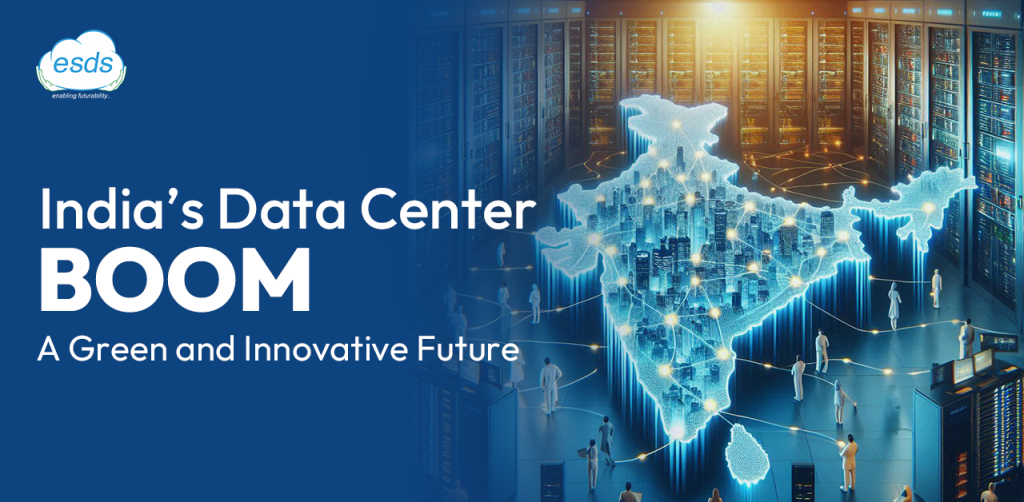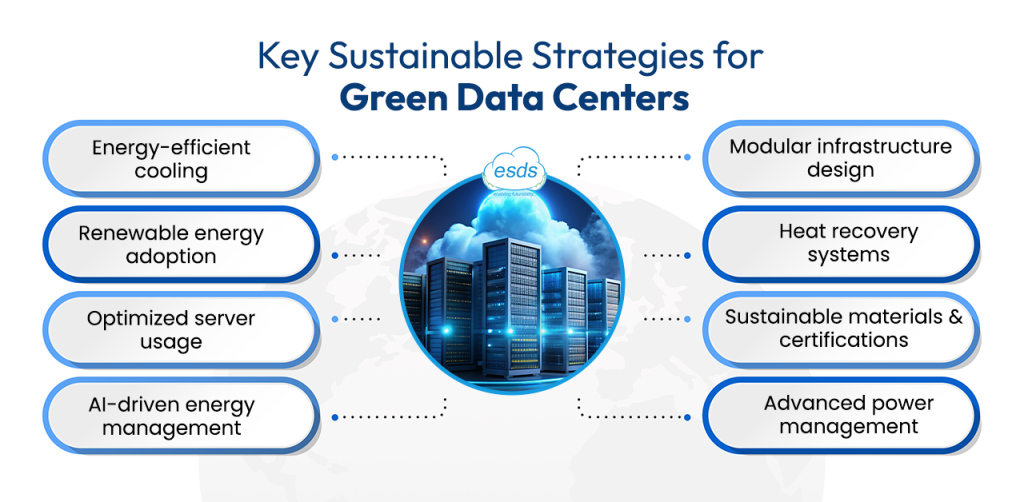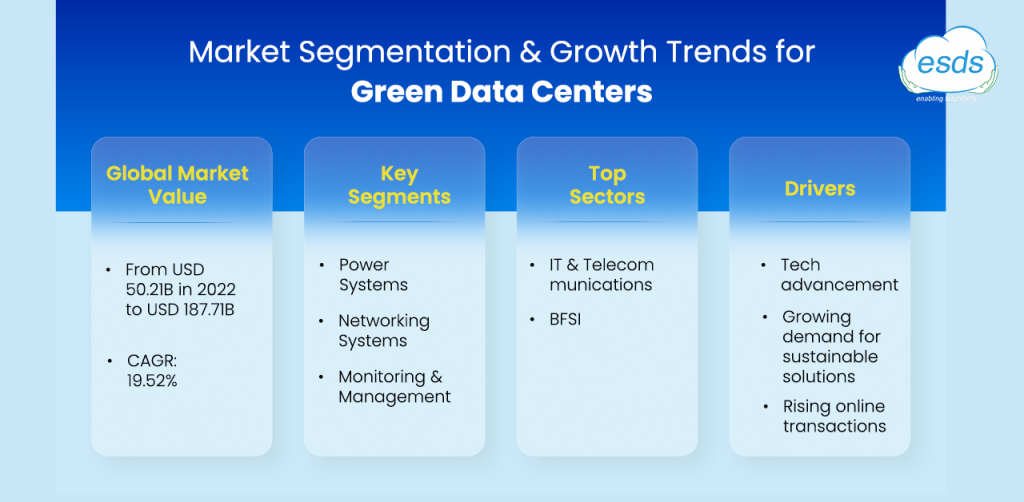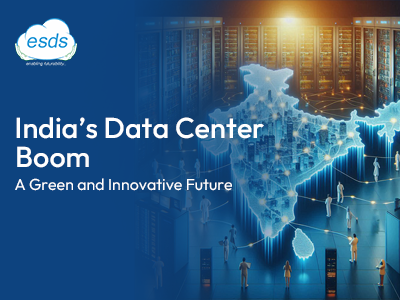India’s Data Center Boom: A Green and Innovative Future

A data center is a hub of computing and storage resources that enables consumer and commercial data and software. Global demand for cloud, colocation, and managed services is driving up the value of data center services real estate. As of March 2024, the U.S. led with 5,381 data centers, followed by Germany with 521 and the UK with 514, reflecting the growing global significance of these infrastructures. As of July 2024, there were 152 data centers in India. Mumbai, with its 37 data centers, led the market. It was followed by Bengaluru, with 21 data centers.
India has become a major player in the global data center business due to its ambitious digital transformation and widespread adoption of data-centric technologies. A thriving e-commerce industry, expanding cloud usage, and more internet access are some factors contributing to the spike in demand for data center services. India is becoming a popular destination for investments in data infrastructure due to the significant growth of the data center industry brought about by the increase in digital activities.
Drivers of India’s data center market growth
The government’s Digital India initiative is one of the main factors in India’s data center services revolution. This program promotes using digital technology across industries to make the country a technology-enabled society. As more companies implement new digital solutions, the volume of data generated and processed has expanded dramatically.
Because of this, there is a greater need for reliable data center services that can securely and effectively handle large workloads.
The Digital Personal Data Protection Act (DPDPA), enacted in 2023, has mandated enterprises to allocate funds towards safe and scalable infrastructure, affecting data center services in India. Businesses that handle sensitive data must invest in state-of-the-art, secure infrastructure because the law enforces stringent data protection regulations. Consumer trust has increased, knowing companies will use the most advanced security procedures to safeguard their data.
As a result, businesses are using increasingly modern data centers equipped with intrusion detection systems, firewalls, and encryption technology.
Laws passed by governments have greatly aided the market’s expansion, and companies of all kinds have quickly embraced cloud computing services. Because cloud technology is affordable, scalable, and flexible, it enables businesses to modernize their IT infrastructure.
The global emergence of India as a data center hub
India’s data center management companies, like those of major global hubs in Australia, Japan, and Singapore, are now prominent. In important Indian locations, the demand for digital services has increased, presenting prospects for significant infrastructure development.
The rapidly expanding e-commerce sector has been a major factor, with businesses depending on data centers to manage the complexities of digital payments, online transactions, and platform management.
Data center providers are progressively implementing cutting-edge solutions, like automation driven by artificial intelligence, to enhance security protocols, predict equipment failures, and optimize operations. India’s data centers are now at the forefront of technological advancement due to this trend towards artificial intelligence, also improving operational efficiency.
Greener data centers and their impact on the environment

An increasing number of people are worried about how these energy-intensive, rapidly expanding data centers will affect the environment. However, in response to these concerns, businesses are moving toward more environmentally friendly and sustainable methods. The desire to lower energy use and carbon footprints drives the popularity of green data centers.
Energy-efficient cooling system development is one of the main innovations in the area. Traditional data centers use a lot of electricity to keep their equipment at ideal temperatures. However, modern green data centers employ cutting-edge cooling methods, including liquid and free air cooling, significantly reducing energy consumption. Increasingly, these facilities are incorporating renewable energy sources, such as wind and solar power, to reduce their environmental impact.
The increasing use of renewable energy sources contributed to a 10–20% rise in data center energy efficiency in 2022 over earlier years. This trend is anticipated to continue as more businesses prioritize sustainability in their data management strategies.
Challenges in Adopting Green Data Centers
Green data center services have many clear benefits, but the transition doesn’t come without challenges. The primary obstacle is the high capital expenditure associated with installing sustainable solutions.
Although data center management companies are dedicated to implementing renewable energy, installing energy-efficient systems, and monitoring ecosystems, the upfront costs associated with infrastructure upgrades can be prohibitively expensive, especially for new players in the market.
Continuous infrastructure investment is required to enable the effective operation of green data centers, further increasing the total cost of ownership. While laws and other government initiatives have eased some of these financial burdens, many companies are still reluctant to bear the upfront expenditures of developing green data centers.
Market segmentation and growth trends

The global market value of green data center services is predicted to increase significantly, from USD 50.21 billion in 2022 to USD 187.71 billion by 2030, representing a compound annual growth rate (CAGR) of almost 19.52%. Technological developments and the growing need for sustainable solutions drive this demand increase.
Solutions, including power, networking, monitoring, and management systems, are used to segment the market. According to top data centers in India, businesses moving to digital platforms drive the demand for robust networking solutions. On the other hand, monitoring systems are expected to expand rapidly because of their vital role in managing a massive volume of data.
The IT and telecommunications sector has the most market revenue in terms of applications since it primarily relies on data centers for networking, system administration, and integration. Yet the BFSI (Banking, Financial Services, and Insurance) sector is also expected to develop significantly as it adopts digital solutions. The explosive growth of online transactions, payment portals, and other digital financial services drives this industry’s need for reliable, environmentally friendly data center infrastructure.
The path ahead for India’s data center market
As India’s digital economy develops, data center services will be a crucial growth pillar. India’s top data centers, like ESDS, pave the way for a sustainable future in the global industry by consistently implementing energy-efficient technology and supporting greener initiatives.
Why ESDS is at the forefront? ESDS implements controls, builds automated systems, and undergoes trusted third-party audits to ensure security and compliance. Banks, government organizations, and the most regulated businesses in India depend on ESDS data centers. ESDS uses seven layers of protection to protect the data of millions of users each month. Banks, government agencies, and other leading companies in India exhibit trust in ESDS. With four major data centers across India – Nashik, Bangalore, Mumbai, and Mohali- ESDS is also reaching globally and established in the US and UK.
To conclude, data center services in India will keep growing as the need for safe, effective, and ecologically friendly data storage solutions rises, enhancing the country’s role as a digital powerhouse.
- Achieving Secure, Reliable Compliance with India’s Data Sovereignty Mandates - November 17, 2025
- Implementing GPU workloads in critical government application - November 12, 2025
- Why Data Sovereignty Is Important for Indian Enterprises - August 22, 2025
